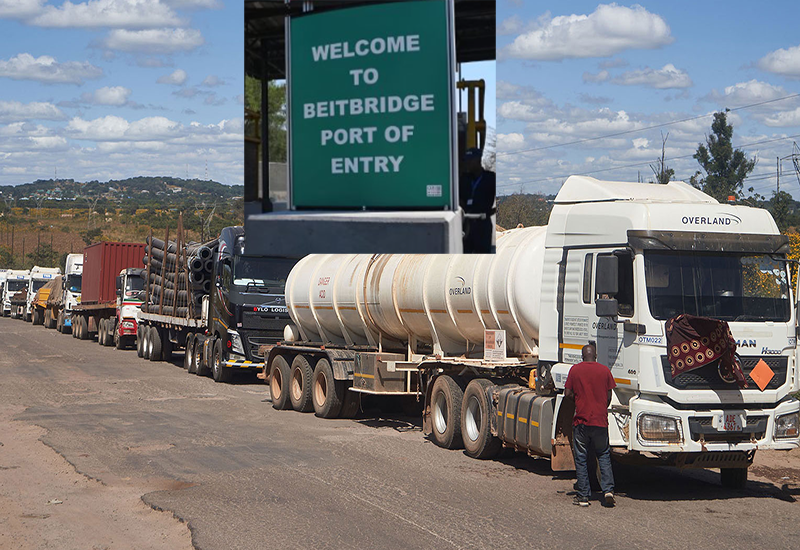- Economy
- No Comment
Cross-border tankers bypass Zimbabwe as ZIMRA’s fuel duty takes its toll; many opt for longer Botswana route

SOUTH AFRICA: Operators responsible for trucking fuel to the Copperbelt are beginning to avoid Zimbabwe because of a duty that has been imposed to combat the in-transit theft of tanker cargo.
According to Mike Fitzmaurice, chief executive of the Federation of East and Southern African Road Transport Associations (Fesarta), at least two major concerns responsible for sizable market-share volumes are no longer using Zimbabwe as a transit country.
This is after the Zimbabwe Revenue Authority (Zimra) instituted duties on the in-transit transportation of petrol, diesel, paraffin, and A1 jet fuel, effective from 10 August, following a related pronouncement by Finance Minister Mthuli Ncube during the mid-term budget speech.
Private-sector stakeholders warned against the potential loss of business related to instituting additional expenses to already cost-intensive operations, but Zimra said the duties, which are payable at ports of entry, would be refunded on exiting Zimbabwe.
Although public officials widely welcomed the development as a potentially effective method to combat fuel theft in Zimbabwe, Fitzmaurice said Zimbabwe’s banking system was not geared for adequate online administration.

“A transporter at a border such as Beitbridge could wait up to two days before duties paid to Zimra reflect in their account. Upon exit, it could take as long or more before your money is refunded.”
He said considering the amount of fuel some operators transported to Zambia and the Democratic Republic of the Congo, the costs related to paying duties on large-fleet operations became prohibitive.
Although it’s not certain what alternative routes port-to-pit operators on the Beira Corridor are considering, hauliers trucking fuel from suppliers such as Sasol in South Africa are avoiding Zimbabwe, preferring instead to drive through Botswana.
Fitzmaurice said although the way around Zimbabwe was at least 200 kilometres longer, it was faster because of current delays at the Beitbridge Border Post between South Africa and Zimbabwe.
A rigid cargo scanning regime, also instituted by Zimra, is proving to be another non-tariff barrier (NTB) trade, scaring cross-border operators away from a transit that has reverted to avoidable conditions characteristic of past problems – bad congestion.
Fesarta’s Transit Assistance Bureau (Transist) continues to record figures indicating decreasing northbound cargo heading into Zimbabwe.
But congestion and fuel duties payable at Beitbridge were not the only things responsible for truck traffic diverting through Botswana, Fitzmaurice said.
The practice of dip-testing tankers at the Chirundu Border Post into Zambia to see if fuel levels had dropped, or whether valuable cargo had been swopped with water, were also forcing operators to avoid Chirundu.
Instead, they rejoin the route to the Copperbelt at Kafue, north of Zimbabwe.
“The problem at Chirundu is that the shed for cargo scanning and the dipping shed are next to one another, so tankers and other cargo carriers all have to stand in the same queue. What’s more, is that they have to queue on the other side of the southbound line, so they have to cross over.”
When Ncube made his announcement on 25 July, he indicated that fuel smuggling in Zimbabwe was still rampant and that cargo tracking was not effectively combating fuel theft.
But Fitzmaurice said it made no sense to target transporters. If there were operators involved in serving black market fuel suppliers, it could be picked up via effectively sealing cargo with satellite tracking devices, thoroughly monitoring truck movements, and compiling post-cleared audits to separate complying operators with non-compliant ones.
“Zimra needs to start looking at who is really involved and it’s not the transporters. Invariably it’s the drivers or someone higher up the system.
“If a truck is sealed properly, internally and the tank hatches on top, there is no way that you can get to the fuel without it being picked up through GPS tracking, showing where a truck is stopping, veering off course and for how long it’s stationary in a certain spot.”
He said it was also strange that, despite the stringent anti-theft curbing conditions and subsequent cargo diverting through Botswana, smuggling continued to hold back Zimbabwe’s faltering economy through revenue loss from cross-border operators opting to bypass Zim altogether.
